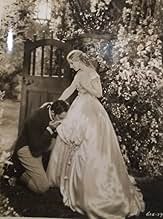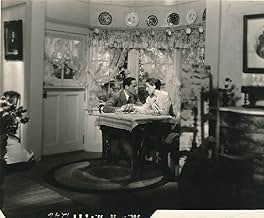Ajouter une intrigue dans votre langueThe adoptive father of a young woman is horrified to learn she plans to marry the son of the man who accidentally killed her aunt years before.The adoptive father of a young woman is horrified to learn she plans to marry the son of the man who accidentally killed her aunt years before.The adoptive father of a young woman is horrified to learn she plans to marry the son of the man who accidentally killed her aunt years before.
- Réalisation
- Scénario
- Casting principal
- Nommé pour 1 Oscar
- 6 victoires et 1 nomination au total
- Minister
- (non crédité)
- Young Party Guest
- (non crédité)
- Young Party Guest
- (non crédité)
- Young Kathleen
- (non crédité)
- Richard Clare
- (non crédité)
- Gardener
- (non crédité)
Avis à la une
He begins to realize, over the years, that the girl he is raising (Norma Shearer) is very similar in looks to his deceased wife. Because of this fact, he has a strong relationship with her.
One night, Shearer is off with a friend to an abandoned house. They find that someone else is there. The person who was there (Fredric March) is actually the son of the man who killed Howard's wife. And the abandoned house was where March grew up.
Shearer falls for March and when Howard sees this, he becomes jealous. Tensions rise in this excellent "tearjerker." It's only flaw is that it seems to get a bit overlong for what it's trying to tell right at the very end.
All of the three leads are amazing and should have been nominated for Oscars. Sadly, the only nomination it did get was Picture, which it should have won.
Norma Shearer, Leslie Howard, and Frederic March all shine in "Smilin' Through," from 1932 MGM.
The story takes place during the latter part of the 19th Century. It concerns an old man, John (Howard) who has been alone since the death of his fiancé, Moonyen Clare. He sits near her grave often, imagining at times that he can hear her.
When a close friend prevails upon him to take in Moonyeen's niece, at first he refuses, and then relents after he meets the child, Kathleen.
Kathleen grows into Norma Shearer and remains close to her uncle. Everyone expects her to marry a young man, Willy.
One night, she and Willy are caught in a rainstorm and find shelter in an old house. A man, Kenneth (March) enters; it was his father's house. He and Kathleen are instantly attracted to one another.
When John finds out about the romance, he has a violent reaction and insists that Kathleen never see Kenneth again. His father was John's mortal enemy and rival for Moonyen. John tells her the whole story. Which is a brutal one. Kathleen is very upset and promises not to see Kenneth again, but she can't stay away from him.
What a beautiful, well-acted film. Some of it may seem overly dramatic, but it's a touching story about eternal love, and how those we love are always with us somehow.
Really needed a box of tissues for this one. Highly recommended.
What a beautiful, well-acted film. Some of it may seem overly dramatic, but it's a touching story about eternal love, and how those we love are always with us somehow.
Really needed a box of tissues for this one. Highly recommended.
Sidney Franklin's film is the quintessential tearjerker, one that I have dreamed of watching all my adult life, and tonight I finally managed. Not many films outlast those sorts of expectations, I found recently that 'Sevent Heaven' was relatively feeble-minded, not the film I had been looking forward to.
'Smilin' Through' triumphs though, soaringly so. The film is not only sumptuous in decor and cinematography, but has a real heart and real intelligence. I loved the way that almost every scene takes place in a garden with burgeoning flora, drooping flowers, heavy with romantic regret and sexual portent. One could almost smell the dizzy perfume of the plants. And I admired the way that Sidney Franklin distinguishes so clearly and yet not demonstratively between the way that young love professes itself in the 1860's, the time of John's and Moonyeen's courtship, and the war years with Kathleen's and Ken's romance. Franklin, in his direction, subtly underlines the tender dewy-eyed romanticism of the old days, "misty, water-colored mem'ries" indeed, with Kathleen perpetually wearing her wedding gown, even in her scenes as a ghost. And in the modern story we have an altogether more practical couple, acting in the context of a world war, with the far-away guns and canons sending rumblings through the village, sending windows and panes rattling. Kathleen in the modern story is more earthy and doesn't, in this pre-Code Hollywood picture, disguise how she is longing for her sexual union with Ken: "By the time I'm through with you, you won't be able to fight anyway", she claims.
The acting is a chapter unto itself. I was never a fan of Leslie Howard's, and although it must be said that his part is probably the least interesting in the film, he conveys an endearing boyishness in the 1860's scenes, easy-going and infectious. Fredric March strikes up a marvelous rapport with Norma Shearer, sending off sparks of a loose energy that seem almost improvised, certainly captivating. Their scenes today should even today serve as must-see footage for acting students. March shows glimpses of the impressive character actor he was to become, and Shearer is luminous and entirely lovable, great performances.
The perfect genre piece, destined to give you the most delicious heartache.
Le saviez-vous
- AnecdotesFredric March commented to his first cousin, Kathryn Davis, about working with Norma Shearer, that, yes, she was a great actress and very professional, but she could be difficult because she constantly expected perfection. When Davis asked what that specifically meant, March replied, "She was never satisfied, kept having us do take after take." Pausing, he continued, unabashed, "Especially our love scenes. She always wanted to redo all the love scenes, several times!" Davis wanted to ask why he supposed Shearer always wanted to retake the love scenes in particular, but thought better of it and kept silent.
- GaffesThe bulk of the story takes place during the WWI era, 1915-1919, but all of Norma Shearer's clothes, hats, and hairstyles are in the 1932 mode, the year the film was made, a typical practice of the era.
- Citations
Kenneth Wayne: How about a toast?
Kathleen: I know one. Here's to your health, your honor, and the health of all your descendants, great and small.
Kenneth Wayne: That's a mighty handsome toast.
Kathleen: But, Irish toasts are the best I know.
Kenneth Wayne: May you keep as young and as pretty as you are, until doomsday, and never forget the man who wished it.
Kathleen: I wonder now, as I look at you, have we never met before?
Kenneth Wayne: No, I guess we haven't. I shouldn't have forgotten.
Kathleen: Oh, could you be Irish too!
Kenneth Wayne: Yeah, I could, if I saw enough of you!
Kathleen: Oh!
- Crédits fousAs MGM would later do with Le Magicien d'Oz (1939), no mention at all is made of any of the actors having dual roles. Thus, the characters "Moonyeen" and "Jeremy Wayne" are not mentioned in the credits, although the characters are drastically important to the story.
- ConnexionsFeatured in The Happy Ending (1969)
- Bandes originalesSmilin' Through
(uncredited)
Written by Arthur A. Penn
Played on piano and sung by Norma Shearer (dubbed by Georgia Stark)
Music integrated into the score throughout
Meilleurs choix
- How long is Smilin' Through?Alimenté par Alexa
Détails
Box-office
- Budget
- 851 000 $US (estimé)
- Durée
- 1h 38min(98 min)
- Couleur
- Rapport de forme
- 1.37 : 1




































